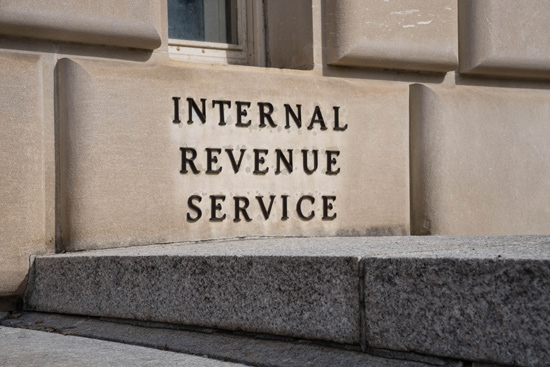Learning Center
The IRS Is Tackling Tax Evasion With AI

As the current tax season continues, the Internal Revenue Service (IRS) has ushered in a new era of tax enforcement thanks to the power of artificial intelligence (AI). AI tools have taken nearly every industry by storm recently, and even federal tax authorities have realized that these resources can be invaluable in catching tax evaders.
Bolstered by funding from the Inflation Reduction Act of 2022, the IRS is improving its audit processes, particularly in areas where audit coverage has dwindled. Large partnerships, large corporations, and employment tax returns are all under the microscope as the IRS seeks to crack down on tax avoidance, particularly among wealthy companies and high-net-worth individuals.

AI Audit Concerns
While AI presents opportunities for more efficient tax audits, some industry experts have expressed concerns about privacy, bias, and transparency. In a Thomson Reuters report, James Creech, a senior manager for Baker Tilly's tax advocacy and controversy team, voiced apprehensions about the potential ramifications of AI-driven audits. He cautioned against the possibility of taxpayers being flagged for returns that deviate slightly from the norm, noting that safeguards will be important in this new era of tax enforcement.
On the flip side, Creech did acknowledge the strides made in AI technology, particularly in targeted audits of partnerships. The AI tools employed by the IRS have already led to better issue selection, expediting the audit process and prompting inquiries regarding specific issues.
Future Outlook and Challenges
The IRS's Strategic Operating Plan for FY 2023 through 2031 showcases a commitment to bolstering enforcement efforts, especially for large partnerships and corporations. However, the human element remains a critical factor in AI implementation. In the aforementioned Thomson Reuters deep dive, Creech pointed out that IRS “audits have been driven by algorithms for a long time,” noting that a “DIF” (discriminant function) score has been used to drive audit selection. Although Creech believes that new AI technology will make audit selection “better and better” in the long run, he still has concerns about “what does the human being do with [algorithmic information.”
This is, of course, something that federal tax authorities will have to consider moving forward as AI becomes an increasingly important part of the auditing process.
AI and the ERC
As the IRS becomes increasingly reliant on AI, tax practitioners may find themselves navigating new terrain, including an increased number of Employee Retention Tax Credit (ERC) audits. In September 2023, the agency unexpectedly suspended all ERC applications. Then, in December, IRS officials announced a program that allowed taxpayers to voluntarily admit to “mistakenly claimed” pandemic-era tax credits.
The ERC, in particular, presents AI difficulties due to limited data availability. Creech made the point that AI's effectiveness hinges on the availability of large data sets, making limited programs like the ERC less amenable to AI-driven scrutiny.
Addressing IRS Audit Red Flags
Wealthy taxpayers should be mindful of IRS audit triggers. According to Kiplinger, these red flags include claiming residence in Puerto Rico without substantiation, engaging in offshore asset movements, and significant cryptocurrency transactions. IRS AI algorithms are poised to detect patterns indicative of tax evasion, highlighting the importance of compliance.

While the IRS's usage of AI technology promises improved tax enforcement and customer service, major change is never without challenges. Questions surrounding algorithmic bias, human interpretation, and data limitations persist – and likely will until far-reaching results of AI technology and taxes are available for assessment.
As the IRS meets the intersection of emerging technology and tax compliance, the onus remains on taxpayers and tax professionals to operate with diligence and integrity. Compliance with tax laws and regulations is important, as always, particularly with the rise of artificial intelligence.
NEVER MISS A STORY.
Sign up for our newsletters and get our articles delivered right to your inbox.
Rose Tax & Financial
Cedar Crest, New Mexico 87008
Sat: 10:00am to 2:00pm
Check the background of your financial professional on FINRA's BrokerCheck
Avantax affiliated Financial Professionals may only conduct business with residents of the states for which they are properly registered. Please note that not all of the investments and services mentioned are available in every state. Securities offered through Avantax Investment Services℠, Member FINRA, SIPC, Investment Advisory services offered through Avantax Advisory ServicesSM, Insurance services offered through an Avantax affiliated insurance agency. 3200 Olympus Blvd., Suite 100, Dallas, TX 75019. 972-870-6000.
The Avantax family of companies exclusively provide financial products and services through its financial representatives. Although Avantax Wealth Management® does not provide or supervise tax or accounting services, Avantax representatives may offer these services through their independent outside business. Content, links, and some material within this website may have been created by a third party for use by an Avantax affiliated representative. This content is for educational and informational purposes only and does not represent the views and opinions of Avantax Wealth Management® or its subsidiaries. Avantax Wealth Management® is not responsible for and does not control, adopt, or endorse any content contained on any third party website.
This information is not intended as tax or legal advice. Please consult legal or tax professionals for specific information regarding your individual situation.
The information being provided is strictly as a courtesy. When you link to any of the web sites provided here, you are leaving this web site. We make no representation as to the completeness or accuracy of information provided at these web sites. Nor is the company liable for any direct or indirect technical or system issues or any consequences.
For Important Information and Form CRS please visit https://www.avantax.com/disclosures.
